The journey to the Retired Racehorse Project Thoroughbred Makeover 2020 continues! Read on for our second update from Amy Smith.
Home Schooling: The Equestrian Version
First off, I hope everyone out there following our progress is staying safe and healthy during these trying times. I can’t imagine a blog entry this month that doesn’t center around the impact that the Coronavirus is having on our lives. I have an old “Life is Good” t-shirt that says “Hold Your Horses” with a girl and her horse, and her arms around his neck, and I’ve been wearing it around the house in quarantine because it feels like life’s message to me right now, despite the obnoxious pastel color.
I have always loved the barn I board at, but I have never been more grateful for the setup there as I have been this past month. Ghost (and my first heart horse, my old man Thunder) live at a very small private farm where the only other horses on the property belong to the barn owner. My tack area and grooming area are separate from hers. During the week, she rides early in the day, and I’m an evening rider. So, extreme “social distancing” at the barn is normal life.
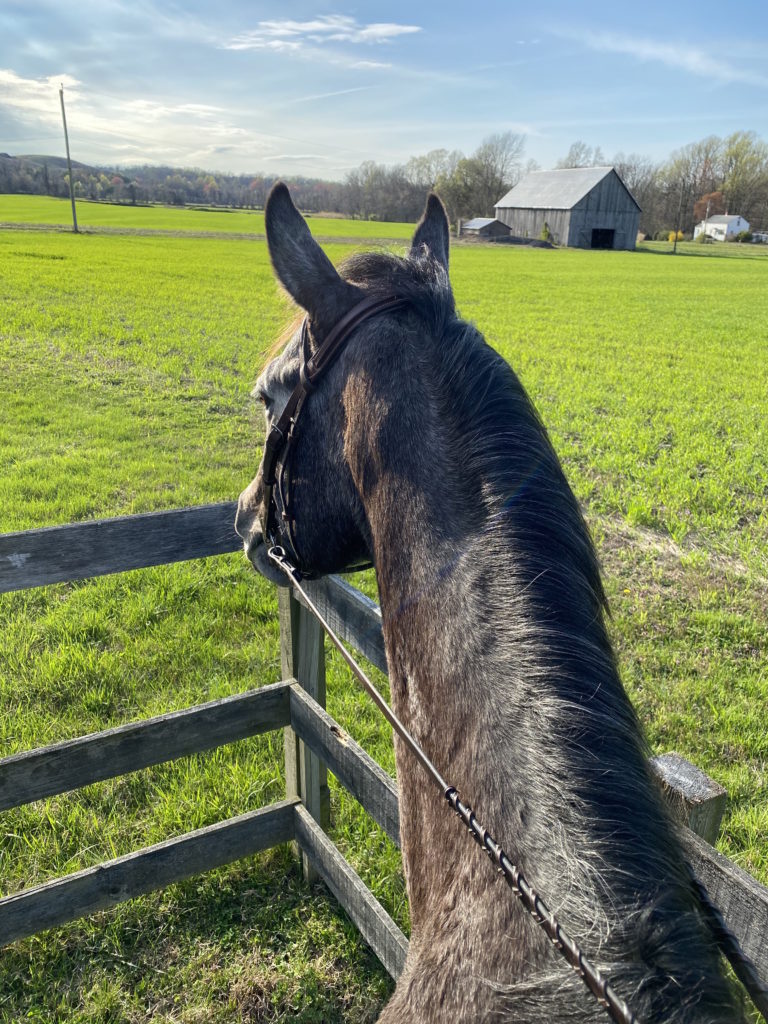 Social distancing in practice. Photo by Amy Smith.
Social distancing in practice. Photo by Amy Smith.
Yep, gratitude is the prevailing sentiment with so many of us during these times. Gratitude for health, family, a paycheck, meals, fur babies that keep our indoor days bathed in love and distraction, and the horses we have waiting for us at the barn that keep big dreams of post-Coronavirus days alive. To my fellow RRP 2020 entrants – when we meet in Kentucky I look forward to celebrating together, because maybe more than any other year in the history of the RRP Makeover, getting there is truly going to be the real victory for all of us.
Only two months ago, I would have thought at this point in time I’d be recapping Ghost’s appearance at the first two horse shows on our local show circuit. The last conversation I had with our trainer about the “upcoming horse show” was a discussion about whether or not Ghost was ready for the 2’ Green Hunter course in the “big boy” ring (as opposed to the 18” mini-vertical-with-no-fillers trot course in the quiet back ring.) We’d decided that his brain was ready for the stimulus of the main ring and the fillers in the jumps, but that we’d probably trot most (if not all) of the fences. What I wouldn’t give to go back to the day when that was the most pressing issue!!
Had the show plan for March survived, I’m confident that Ghost would have trotted those fences like a pro. March and April have been about trotting fences. And trotting fences. And trotting fences. Ghost and I are the self-anointed Pandemic Trot Fence Champions. I know the feeling of aching to just canter the fences the way a little kid aches to take training wheels off their first bike. However, as much as he’s perfectly happy to canter right over a 2’-2’3ish fence (sometimes, I can’t resist the temptation) the trotting is making him go to the base, it’s making him relax, and it’s strengthening his hind end.
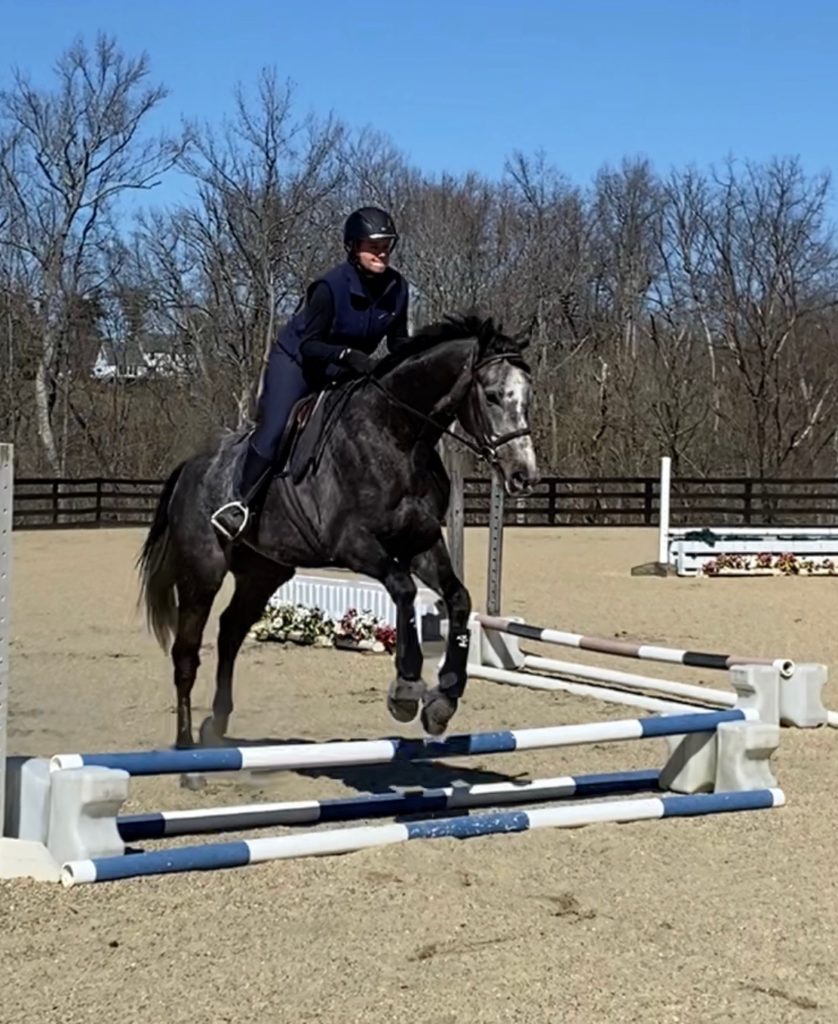 Trotting fences over one month ago. Photo by Amy Smith.
Trotting fences over one month ago. Photo by Amy Smith.
He’s a big horse (16.3h and still filling out), and his balance has improved dramatically in the past few months. The trot has felt great for a while now, and our big project this month (besides trot fences!) has been his canter. He needed to get his hind end underneath him and carry himself from it, needed to soften on the bit as he found his balance, and most importantly – he needed to become adjustable. We have multiple lines of ground poles that we canter through every ride: Add a stride. Go through doing full strides. Try to double-add. Canter the poles uphill. Canter them downhill. (We put one line of poles on an incline in the ring intentionally for balance work.)
 Canter practice. Photo by Amy Smith.
Canter practice. Photo by Amy Smith.
One of the first nuggets of wisdom offered up to the 2020 RRP entries (from the masses of trainers who have followed this route before) was to stay in your lane. This translates into: Don’t worry about how much progress others are making; just focus on your own horse and go at your own pace. It was sage advice. As I watched videos of Makeover hopefuls cruising around small courses at home, I couldn’t help but wonder if our need to build Ghost up more slowly meant that he just wasn’t as “natural” at it.
The balance and adjustability were really starting to take shape. The ground poles were a hard measurement of it, and the more subjective measurement was how much lighter he felt in my hands. He was trotting to the base of fences and starting to push off much more with his hind end. It was becoming routine and was devoid of any anticipation. It is now consistently a round, hind end spring action in place of the occasional legs-everywhere fumbling of Extreme Cavalletti.
As much as I was glowing with pride when we stole a moment from our trot homework and cantered a fence, I had to admit that when we first tried cantering fences, he sometimes took a longer spot in his eagerness. [Insert sheepish amateur admission here]. It doesn’t help matters that his rider battles her own desires to choose those distances at times. Lookin’ at you, mirror.
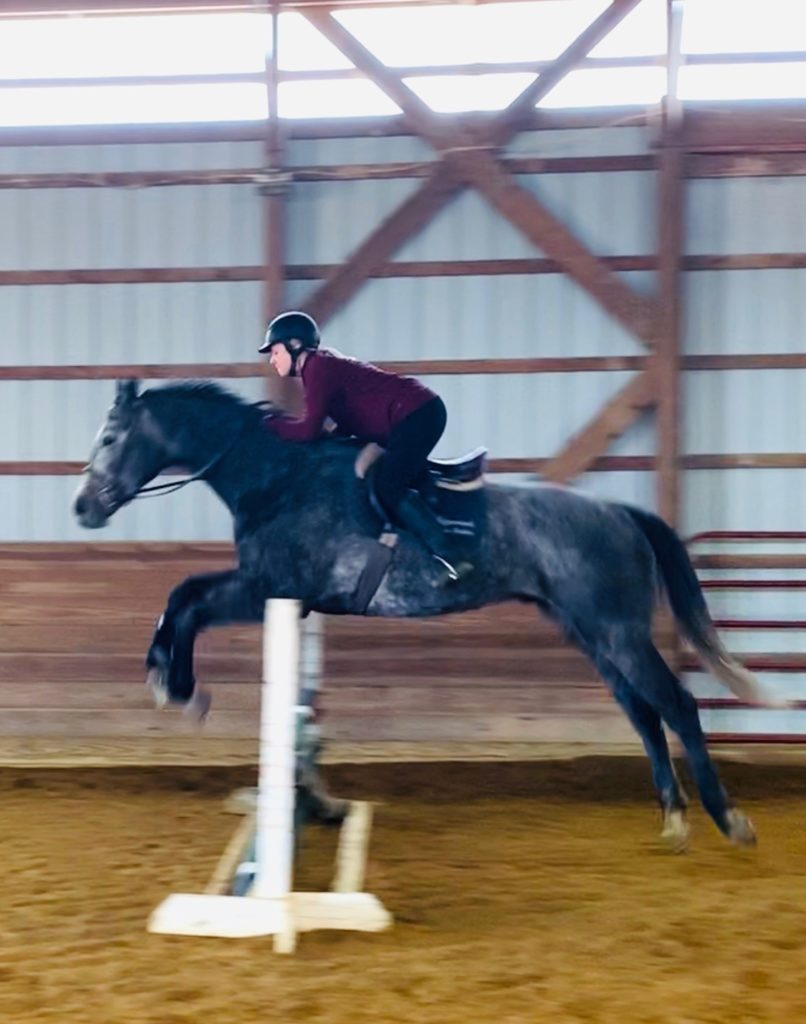 He’s a good boy and will canter fences, but here’s an example of our “flier.” Photo by Russ Smith.
He’s a good boy and will canter fences, but here’s an example of our “flier.” Photo by Russ Smith.
I knew we needed to take our time…and TROT.ALL.THE.FENCES. Our homework has been consistently reinforced by slow but steady improvement. We worked on perfecting the basics. Get straight to the fence. Soft canter away. Come back quietly to the trot (great opportunity to perfect the transitions).
Last week, it really did all come together. After trotting a couple small verticals, we held the canter and went over a single, and then another. It was soft, round, and quiet. It was the perfect reward for patience.
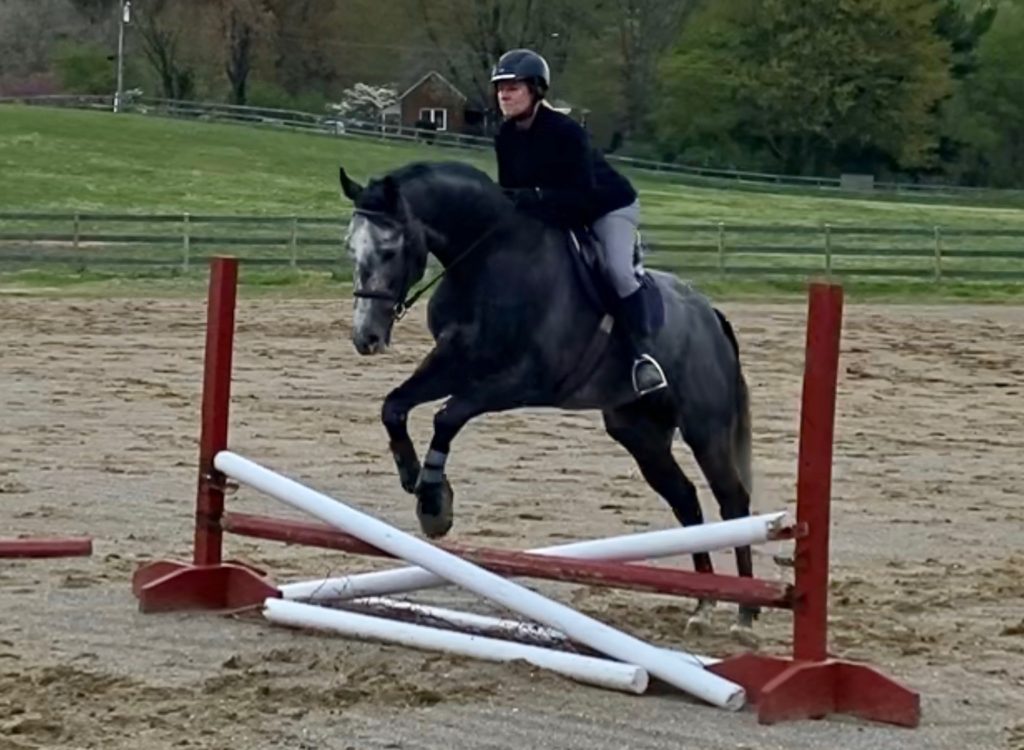 Ghost’s jump has improved so much! This photo was taken one week ago. Photo by Amy Smith.
Ghost’s jump has improved so much! This photo was taken one week ago. Photo by Amy Smith.
It’s the theme we’re all living with right now…patience.
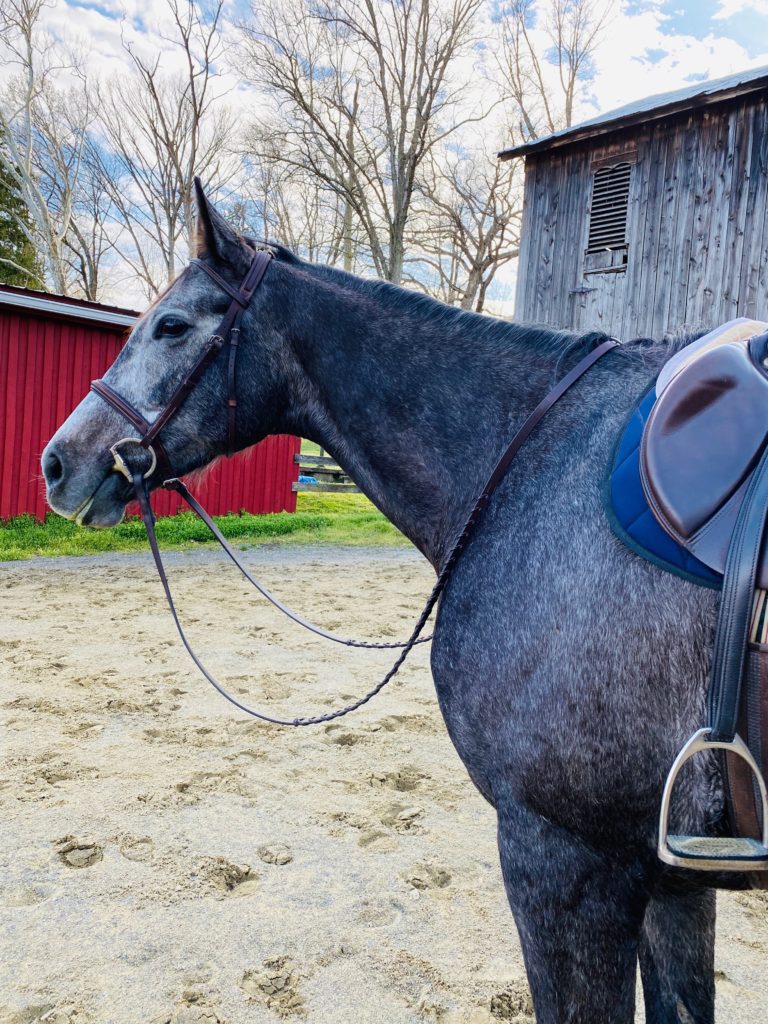 What keeps me grounded these days. Photo by Amy Smith.
What keeps me grounded these days. Photo by Amy Smith.
Want to follow along on Amy and Ghost’s journey before their next blog update? Click here to “like” and follow their Facebook page!
About Amy
Originally from Homestead, Florida, Amy Smith moved to the DC area after college and went on to work on Capitol Hill for almost 17 years. She now works for The Boeing Company. She also is an active duty military spouse married to her husband, Russ, and is involved in several volunteer activities/charitable organizations, including serving as a board member for the Navy Marine Corps Relief Society and a Tragedy Assistance Program Ambassador. Amy has ridden horses since she was a young child and has purchased and re-trained three OTTBs since 2005: Silent Thunder, National Standard, and Chief Tarhe (Ghost). She began volunteering for CANTER Mid-Atlantic in 2007 and became the Executive Director for CANTER Maryland in 2016. She visits the backstretch of Laurel Park approximately twice per month to take listings from trainers looking to rehome their horses, and has helped place homes for hundreds of horses in her years at both Laurel Park and Pimlico.
